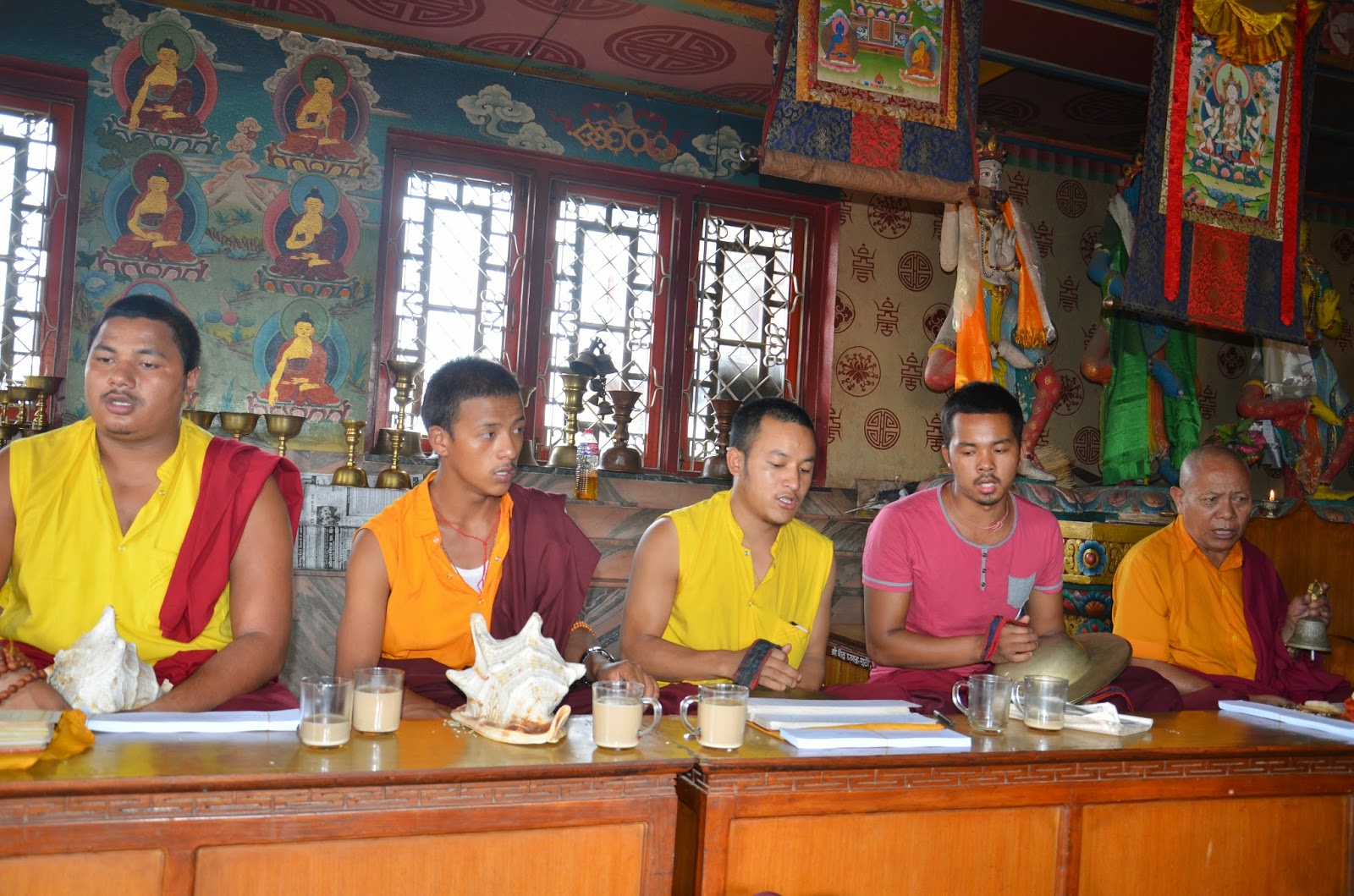Traditional Buddhist Marriage Ceremony with Great Nepal Treks in Nepal
Traditional Buddhist Marriage Ceremony
The Buddhist religion is known for being basic and this is frequently reflected in their wedding functions. The Buddha did not consider marriage to be a sacrosanct ceremony; thus it is a more social occasion instead of a religious event. Buddhist weddings don't contain any perplexing ceremonies that may be seen in other different religious wedding functions. A Buddhist wedding service is intended to symbolize the strength of the bond between two individuals. It is a marriage focused around otherworldly confidence and not fixated on religion, where both couples truly promise to keep up an agreeable and profoundly sound relationship. More than anything, a marriage to Buddhists is focused around trust and conviction. They believe that life is a continuing process of change and that you should always be moving towards a state of greater wisdom and awareness. There are no religious or compulsory protocols that the couple must take after. The whole wedding service is carried out rather like a social undertaking.
For the commencement of the wedding a Lama is visited to know if the groom and the bride’s have their horoscopes aligned. He will also help the groom find what could be a spiritual day to present a proposal to the bride.
The ceremony consists of two main parts, one being Buddhist, the other is a non-Buddhist. All the traditional practices such as feast or gift exchange happen to fall under the non-Buddhist part of the ceremony. The Buddhist part of the ceremony consists of prayers and gifts offered to the almighty and the monks. Vows of faithfulness to each other are taken in this part. They get a chance to select the scriptures they want to have read in their wedding. One of these very traditions incorporates both the bride and groom walking through the aisle carrying 21 strands of beads. The strand is called the ‘O juju’.
On the night before the wedding day, a religious ceremony is performed wherein the wife and husbands-to-be pay honor to the bride’s ancestors. The newlyweds are made to sit in front of the altar and nine monks are invited. A holy string joins the heads of the man and woman and is then unrolled into the priest's hands. Close to the first monk there is a vessel with a candle and water within. This is utilized as heavenly water for the following day. One priest holds a fan in one hand and a microphone in the other hand. The entire town can listen to the supplications to God being said to pay tribute to the couple. After the end of the supplications to God they backtrack to the sanctuary. A customary pledge goes as follows: The groom will say, “Towards my wife I undertake to love and respect her, be kind and considerate, be faithful, delegate domestic management and present gifts to please her.” The bride will then say, “Towards my husband I undertake to perform my household duties efficiently, be hospitable to my in-laws and friends of my husband, be faithful, protect and invest our earnings and discharge my responsibilities lovingly and fastidiously.”
Prayers are said and holy water is thrown at the guests on the morning of the day of the wedding.
The string placed yet again on the couple’s heads that forms a circle around them. Nine trays each of which consist of different dishes is placed in front of the monks. Monks cannot touch money so at the end of the prayers, the newlyweds give the monks an envelope containing money.
There are no specific compulsory attires to be worn for the wedding. The groom may choose to wear a suit and the groom may go for anything which isn't too revealing. Of course, the guests need to remember that they need to remove their shoes before they enter the temple for the blessings.
The ceremony is literally incomplete without music and dance. Traditional dances and women with independent folk performance exhibit their elegance in the wedding. As or the food, Buddhists prefer beef (not in some countries) or pork with a side dish of rice. Buddhists traditionally go for the oriental dishes, so they are generally steamed or roasted.
For the commencement of the wedding a Lama is visited to know if the groom and the bride’s have their horoscopes aligned. He will also help the groom find what could be a spiritual day to present a proposal to the bride.
The ceremony consists of two main parts, one being Buddhist, the other is a non-Buddhist. All the traditional practices such as feast or gift exchange happen to fall under the non-Buddhist part of the ceremony. The Buddhist part of the ceremony consists of prayers and gifts offered to the almighty and the monks. Vows of faithfulness to each other are taken in this part. They get a chance to select the scriptures they want to have read in their wedding. One of these very traditions incorporates both the bride and groom walking through the aisle carrying 21 strands of beads. The strand is called the ‘O juju’.
On the night before the wedding day, a religious ceremony is performed wherein the wife and husbands-to-be pay honor to the bride’s ancestors. The newlyweds are made to sit in front of the altar and nine monks are invited. A holy string joins the heads of the man and woman and is then unrolled into the priest's hands. Close to the first monk there is a vessel with a candle and water within. This is utilized as heavenly water for the following day. One priest holds a fan in one hand and a microphone in the other hand. The entire town can listen to the supplications to God being said to pay tribute to the couple. After the end of the supplications to God they backtrack to the sanctuary. A customary pledge goes as follows: The groom will say, “Towards my wife I undertake to love and respect her, be kind and considerate, be faithful, delegate domestic management and present gifts to please her.” The bride will then say, “Towards my husband I undertake to perform my household duties efficiently, be hospitable to my in-laws and friends of my husband, be faithful, protect and invest our earnings and discharge my responsibilities lovingly and fastidiously.”
Prayers are said and holy water is thrown at the guests on the morning of the day of the wedding.
The string placed yet again on the couple’s heads that forms a circle around them. Nine trays each of which consist of different dishes is placed in front of the monks. Monks cannot touch money so at the end of the prayers, the newlyweds give the monks an envelope containing money.
There are no specific compulsory attires to be worn for the wedding. The groom may choose to wear a suit and the groom may go for anything which isn't too revealing. Of course, the guests need to remember that they need to remove their shoes before they enter the temple for the blessings.
The ceremony is literally incomplete without music and dance. Traditional dances and women with independent folk performance exhibit their elegance in the wedding. As or the food, Buddhists prefer beef (not in some countries) or pork with a side dish of rice. Buddhists traditionally go for the oriental dishes, so they are generally steamed or roasted.
A Buddhist wedding is all about simplicity and placidness. By having a simple wedding, this elegant tradition provides for the focus on the more important aspect of the day; the bride, the groom and the love that’s in the air.



Comments
Post a Comment